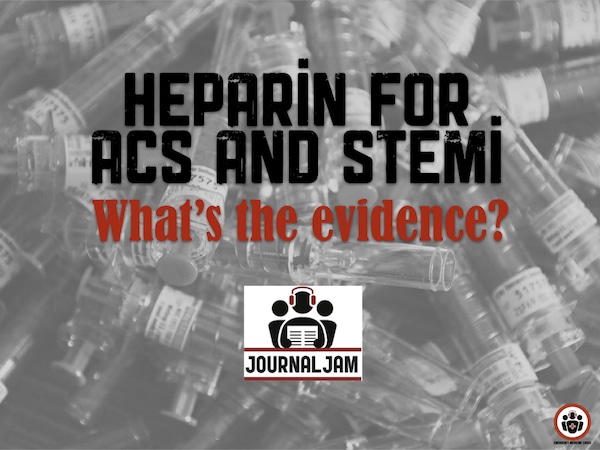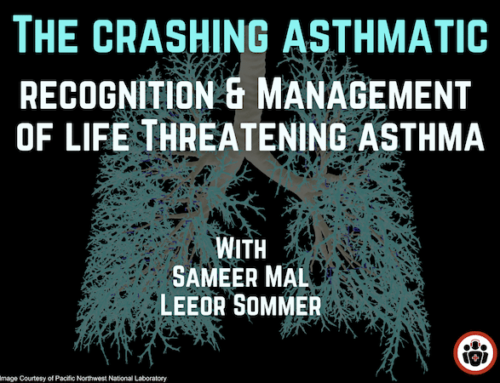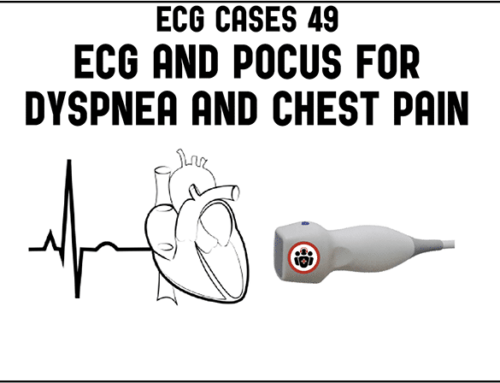Where I work, when a 60 year old man rolls into the resuscitation room with crushing chest pain and diaphoresis and I get handed the EMS ECG showing an obvious anterior STEMI, it’s kind of a no-brainer: Call a “Code STEMI” and tick off a bunch of boxes so that the nurses can go ahead a give a bunch of meds before the patient is whisked off to the cath lab. On that tick box list is ASA, with a NNT of 42 to prevent death [1]. Next on the list is heparin. I’ve been ticking that box for just about every patient with a STEMI, but now that I’ve reviewed the literature, I’m not so sure I should always be ticking that box – especially in the patient with more than a zero HAS-BLED score. What about NSTEMI or unstable angina? Does heparin – LMWH or unfractionated heparin – benefit the patient with, say, a pretty good story for angina with a bump in their troponin and some ST depression in the lateral leads? I think we’re expected to routinely give heparin for all these NSTEMI and unstable angina patients with any ischemic changes seen on the ECG, right? But should we?….
Podcast production by Justin Morgenstern, Rory Spiegel and Anton Helman.
Podcast editing and sound design by Katrina D’Amore & Anton Helman. Blog summary by Anton Helman, Jan 2020.
Cite this podcast as: Helman, A. Morgenstern, J. Spiegel, R. Journal Jam 16 – Heparin for ACS and STEMI. Emergency Medicine Cases. January, 2020. https://emergencymedicinecases.com/journal-jam-heparin-acs-stemi. Accessed [date]
Heparin for ACS: NSTEMI and unstable angina
Cochrane review 2014 [2]
Heparin, for NSTEMI, when compared to placebo resulted in
- No change in mortality
- No change in revascularization
- No change in recurrent angina
- A small decrease in non-fatal MI
- A small increase in major bleeding
8 RCTs on heparin for ACS [3-10]
Early studies in the late 1980’s and early 1990’s showed a small decrease in the rate of MI while on heparin that disappeared after the heparin is stopped.
Subsequent studies asked if there was any benefit to continuing heparin for 30 days. They found that while the combined outcomes of recurrent angina/MI/death looked promising for benefit, when looked at separately, there was no mortality benefit, no recurrent MI benefit, and only some recurrent angina benefit – a subjective outcome. At 30 days they found an increase in major bleeding complications. Some of these trials noticed a benefit during the first week which led to further studies in the mid-1990’s that suggested a slight decrease in non-fatal MI in the first week balanced against an increased risk of major bleeding complications at one month of about 1 in 33. Based on the totality of this data, it appears that heparin is not a life-saving medication in ACS and that it is unlikely to benefit NSTEMI or unstable angina patients, except perhaps those who are at very low risk for bleeding complications for the first week after the event.
Heparin for STEMI and/or PCI with or without thrombolytics
Does heparin benefit STEMI patients who are going to the cath lab for PCI without thrombolytics?
The surprising answer is: we don’t know. It has never been adequately studied. The AHA guideline [12] does recommend heparin for patients with STEMI going to the cath lab, however this is based on a level C recommendation (consensus expert opinion). They state “This recommendation does not come specifically from empirical data”. For patients with stable CAD undergoing elective PCI there has been only a single double-blind RCT of 700 which found that placebo was statistically noninferior to heparin for the primary outcome of a composite of death, MI and revascularization at 30 days, with more periprocedural MIs as well as bleeding complications in the heparin group.
Does heparin benefit STEMI patients who are treated with thrombolytics?
There are 7 major RCTs [13-19] looking at this question, with the first 3 showing no benefit in patient-oriented outcomes and increase in bleeding complications, one (AMI-SK study) showing a hint at benefit in terms of non-fatal MI (partially balanced by an increase in major bleeding), and one that used LMWH (CREATE study) showing a benefit in mortality of 0.9%, again partially balanced with an increased risk of major bleeding complications.
Take home message for heparin in ACS and STEMI
Heparin should not be considered as routine therapy for ACS and STEMI. Based on lack of clear benefit in the literature, it is not unreasonable to withhold heparin for both ACS and STEMI patients, especially in patients who are at moderate or high risk for bleeding complications.
References for heparin for ACS and STEMI
ASA for STEMI
1.ISIS2: Randomized trial of intravenous streptokinase, oral aspirin, both, or neither among 17187 cases of suspected acute myocardial infarction. Lancet. 1988 Aug 13;2(8607):349-60.
Heparin for ACS/NSTEMI
2.Andrade-Castellanos CA, Colunga-Lozano LE, Delgado-Figueroa N, Magee K. Heparin versus placebo for non-ST elevation acute coronary syndromes. Cochrane Database Syst Rev. 2014;6:CD003462.
3.Théroux P, Ouimet H, McCans J, et al. Aspirin, heparin, or both to treat acute unstable angina. N Engl J Med. 1988;319:(17)1105-11.
4.The RISC trial: Risk of myocardial infarction and death during treatment with low dose aspirin and intravenous heparin in men with unstable coronary artery disease. The RISC Group. Lancet. 1990;336:(8719)827-30.
5.Cohen M, Adams PC, Hawkins L, Bach M, Fuster V. Usefulness of antithrombotic therapy in resting angina pectoris or non-Q-wave myocardial infarction in preventing death and myocardial infarction (a pilot study from the Antithrombotic Therapy in Acute Coronary Syndromes Study Group). Am J Cardiol. 1990;66:(19)1287-92.
6.Holdright D, Patel D, Cunningham D, et al. Comparison of the effect of heparin and aspirin versus aspirin alone on transient myocardial ischemia and in-hospital prognosis in patients with unstable angina. J Am Coll Cardiol. 1994;24:(1)39-45.
7.Cohen M, Adams PC, Parry G, et al. Combination antithrombotic therapy in unstable rest angina and non-Q-wave infarction in nonprior aspirin users. Primary end points analysis from the ATACS trial. Antithrombotic Therapy in Acute Coronary Syndromes Research Group. Circulation. 1994;89:(1)81-8.
8.Gurfinkel EP, Manos EJ, Mejaíl RI, et al. Low molecular weight heparin versus regular heparin or aspirin in the treatment of unstable angina and silent ischemia. J Am Coll Cardiol. 1995;26:(2)313-8.
9.The FRISC trial: Low-molecular-weight heparin during instability in coronary artery disease, Fragmin during Instability in Coronary Artery Disease (FRISC) study group. Lancet (London, England). 1996; 347(9001):561-8.
10.The FAMI trial: Kakkar VV, Iyengar SS, De Lorenzo F, Hargreaves JR, Kadziola ZA, . Low molecular weight heparin for treatment of acute myocardial infarction (FAMI): Fragmin (dalteparin sodium) in acute myocardial infarction. Indian heart journal. ; 52(5):533-9.
11.Chen JY, He PC, Liu YH, et al. Association of Parenteral Anticoagulation Therapy With Outcomes in Chinese Patients Undergoing Percutaneous Coronary Intervention for Non-ST-Segment Elevation Acute Coronary Syndrome. JAMA internal medicine. 2018.
Heparin for STEMI
12.Antman EM, Anbe DT, Armstrong PW, et al. ACC/AHA guidelines for the management of patients with ST-elevation myocardial infarction–executive summary. A report of the American College of Cardiology/American Heart Association Task Force on Practice Guidelines (Writing Committee to revise the 1999 guidelines for the management of patients with acute myocardial infarction). Journal of the American College of Cardiology. 2004; 44(3):671-719.
13.Stabile E, Nammas W, Salemme L, et al. The CIAO (Coronary Interventions Antiplatelet-based Only) Study: a randomized study comparing standard anticoagulation regimen to absence of anticoagulation for elective percutaneous coronary intervention. Journal of the American College of Cardiology. 2008; 52(16):1293-8.
14.GISSI-2: a factorial randomised trial of alteplase versus streptokinase and heparin versus no heparin among 12,490 patients with acute myocardial infarction. Gruppo Italiano per lo Studio della Sopravvivenza nell’Infarto Miocardico. Lancet. 1990; 336(8707):65-71.
15.In-hospital mortality and clinical course of 20,891 patients with suspected acute myocardial infarction randomised between alteplase and streptokinase with or without heparin. The International Study Group. Lancet. 1990; 336(8707):71-5.
16.Kontny F, Dale J, Abildgaard U, Pedersen TR. Randomized trial of low molecular weight heparin (dalteparin) in prevention of left ventricular thrombus formation and arterial embolism after acute anterior myocardial infarction: the Fragmin in Acute Myocardial Infarction (FRAMI) Study. Journal of the American College of Cardiology. 1997; 30(4):962-9.
17.Simoons M, Krzemiñska-Pakula M, Alonso A, et al. Improved reperfusion and clinical outcome with enoxaparin as an adjunct to streptokinase thrombolysis in acute myocardial infarction. The AMI-SK study. European heart journal. 2002; 23(16):1282-90.
18.Yusuf S, Mehta SR, Xie C, et al. Effects of reviparin, a low-molecular-weight heparin, on mortality, reinfarction, and strokes in patients with acute myocardial infarction presenting with ST-segment elevation. JAMA. 2005; 293(4):427-35.
Additional FOAMed resources for heparin in ACS and STEMI
First10EM Heparin in STEMI and PCI
First10EM Heparin for Acute Coronary Syndrome
PulmCrit Heparin isn’t beneficial for non-invasive management of NSTEMI
REBELEM No More Heparin for NSTEMI





Was wondering about patients who are hospitalized for NSTEMI and put on LMWH or heparine until they go to the cath lab. In these cases, wouldn’t there be a benefit to delay a 2nd MI until they have their stent?
Thanks!